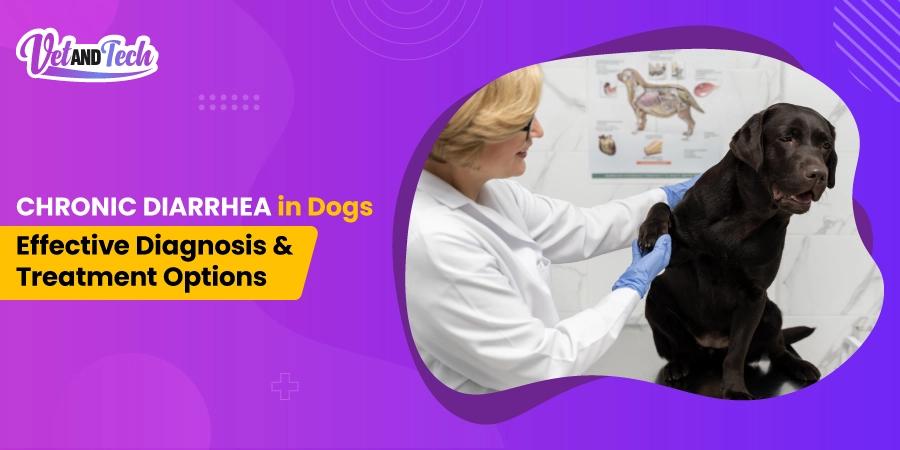Chronic Diarrhea in Dogs - Effective Diagnosis and Treatment Options
Knowing the exact cause of what triggers the diarrhea is challenging because several issues can cause diarrhea in dogs.
Diarrhea is a common disorder that can impact pet life if it persists. Vet Techs frequently observe this issue in dogs, whether short-term or chronic.
However, dealing with chronic diarrhea is not easy, just like treating a normal one. It requires specialized training, field experience, and a diagnostic approach for successful treatment.
Veterinarians and vet students often struggle to determine the root cause.
This blog will discuss key factors like:
- Common diarrhea causes
- Importance of rational diagnostic approach
- How to manage diarrhea in clinical practice
- Effective plans for diarrhea treatment for dogs
- Webinars covering 'Rational Approach to Chronic Diarrhea in Dogs'
- What students and veterinary professionals can get from our webinar
- Chronic GI Disorders in dogs
- Importance of continuing education for veterinarians
- And many more.
Causes of Diarrhea in Dogs
Knowing what exactly causes diarrhea is the first step in treatment, as several things trigger the disease. Sometimes, a dog has diarrhea but is acting fine, which can make it challenging to identify the underlying issue.
Here are some common reasons that have been observed in day-to-day clinic activities while dealing with diarrhea in dogs.
- Eating garbage or spoiled food
- Stress or anxiety
- Change in diet or treats
- Viral infections (parvovirus, coronavirus)
- Ingestion of foreign objects
- Ingesting toxins or Poisoning
- Parasites like Giardia, whipworms, hookworms
- Bacterial infections (salmonella – the major propeller)
- Pancreatitis
- (IBD) Inflammatory bowel disease
- Kidney or Liver disease
- Medications such as antibiotics
- Colitis
- Intestinal cancer
Importance of a Rational Diagnostic Approach
Veterinarians need a rational diagnostic approach. This helps avoid misdiagnosis, save time, and ensure the dog gets the right treatment.
A diagnostic approach usually involves:
- History Taking
Ask about the dog’s diet, environment, and previous illnesses.
- Physical Exam
Always look for signs such as bloating, dehydration, or abdominal discomfort.
- Lab Tests
Stool samples and blood work help detect infections or other abnormalities.
- Imaging
If the cause is not traced with lab tests, take X-rays or ultrasounds to view the digestive tract.
Earn 1 RACE-Approved CE Credit: Watch Dr. Katie Tolbert Master Feline Chronic Enteropathy
Presented by Expert Dr. Katie Tolbert – Learn a comprehensive diagnostic and therapeutic approach to feline chronic enteropathy. Sponsored by Tiki Cat®.
Managing Dog Diarrhea in Clinical Practice
Once the cause is identified, diarrhea treatment for dogs must be followed quickly.
In clinical practice, managing diarrhea in dogs requires a customized approach. Chronic cases, in particular, demand careful attention.
Here are the common management strategies:
Fluid Therapy
- In case of severe dehydration, use IV fluids
- Rehydration restores electrolyte balance.
- Prevents further complications from fluid loss.
Diet Changes
- Change regular diet routine to hypoallergenic or easily digestible food.
- Avoid fatty, spicy, or rich foods.
- Gradual transition to prevent further upset.
Medication
- Treat bacterial infections and related issues with antibiotics.
- Use anti-inflammatory drugs for IBD or chronic conditions.
- Prescribe according to specific diagnosis.
Probiotics
- Replenish beneficial gut bacteria.
- Support digestive health and reduce symptoms.
- Promote long-term gastrointestinal balance.
Owner Education
- Advise on proper feeding techniques.
- Emphasize the importance of hydration.
- Highlight signs of worsening symptoms to monitor.
Chronic cases can be more challenging, especially if the cause isn’t immediately clear. Patience and follow-ups are key to success.
Treatment Plans for Dog Diarrhea
Creating an effective treatment plan for dog diarrhea involves a few key steps:
- Determine the Cause
This is the foundation of any treatment plan.
- Choose the Right Diet
High-fiber or prescription diets can improve symptoms.
- Monitor Symptoms
Track how the dog responds to treatment.
- Follow-Up Appointments
Check the dog regularly to adjust the plan if needed.
- Communication with Owners
Keep pet owners informed about progress and next steps.
For veterinarians, dealing with chronic cases can feel frustrating. However, with a systematic plan, most dogs respond well to treatment.
Veterinary Education for GI Disorders
Understanding chronic GI disorders is essential for every veterinarian. Chronic diarrhea can indicate more severe gastrointestinal issues.
- Regular education enhances diagnostic accuracy.
- Webinars keep vets updated on the latest treatments.
- Practical insights from webinars help manage complex cases.
- Continuous learning improves treatment outcomes for GI disorders.
- Veterinary webinars offer convenient access to expert knowledge.
Webinars allow veterinarians to stay updated on the latest advancements and provide practical insights into challenging cases.
How Can Students and Veterinarians Benefit from This Webinar?
The webinar is designed to improve the knowledge of veterinary students and professional veterinarians about chronic diarrhea.
- RACE-approved webinar and the participant will earn 1 CE credit.
- Will get practical insights and diagnostic approaches to treat dog diarrhea.
- Learn about advanced therapy methods that can raise your success rate.
- Establish a connection with peers and talk about your session experiences.
- Get answers to your most pressing questions directly from an expert.
Veterinarians may keep up with industry standards by attending webinars. Knowing this is essential for treating long-term gastrointestinal problems in dogs.
Diagnostic Approach to Diarrhea in Dogs
Diagnosing chronic diarrhea is more than just treating symptoms. A step-by-step process is essential to identify the cause.
Here are the key diagnostic tools veterinarians should use:
- Fecal Testing
Check for parasites or bacterial infections.
- Blood Work
Look for signs of systemic issues like liver or kidney disease.
- Ultrasound
This helps to detect abnormalities in the gastrointestinal tract.
- Biopsy
In some chronic cases, a biopsy may be needed to confirm conditions like IBD.
Each of these tools provides critical information that can guide treatment.
For instance, a biopsy can confirm if chronic enteropathy is present, while ultrasounds can rule out structural issues.
Chronic GI Disorders in Dogs
Canine gastrointestinal disorders like inflammatory bowel disease are a leading cause of chronic diarrhea. These disorders require long-term treatment and management.
For veterinarians, managing these disorders involves a delicate balance:
- Anti-Inflammatory Medications
These help reduce symptoms like diarrhea and vomiting.
- Immunosuppressants
In severe cases, drugs that suppress the immune system may be needed.
- Regular Monitoring
Chronic GI disorders require ongoing care, with frequent check-ups to adjust treatment.
- Client Education
Communicating the long-term nature of these diseases with pet owners is essential.
Failure to manage these conditions properly can result in worsening symptoms and poor quality of life for the dog.
Why Continuing Education Is Necessary for Veterinary Professionals?
Gastrointestinal issues constantly evolve, so attending webinars, reading journals, and participating in peer discussions keeps veterinarians updated.
Below are some of the reasons why continuing education is necessary for veterinary professionals.
- Ensures awareness of new GI disorder treatments.
- Webinars provide access to expert insights.
- Encourages collaboration through peer discussions.
- Helps students bridge theory and practice.
- Improves diagnostic and treatment skills.
- Enhances clinical decision-making and outcomes.
For students, webinars like the one on chronic diarrhea offer an invaluable opportunity to learn from experts.
Summing Up!
If we talk about short-term dog diarrhea, it might be caused by the listed reasons, but if it persists for a longer time and changes to chronic, it needs special attention.
Veterinarians must be knowledgeable about new, emerging challenges in the gastrointestinal field, especially diarrhea cases. A structured and rational diagnostic approach should be used to treat the issue efficiently.
Join the productive “Rational Approach to Chronic Diarrhea in Dogs” webinar on October 16, 2024. It is a valuable opportunity for professional veterinarians and students who want to improve their diagnostic and clinical skills in chronic diarrhea in detail. Additionally, they will gain valuable CE credits.
Don’t forget to share this blog with fellow veterinarians or students








